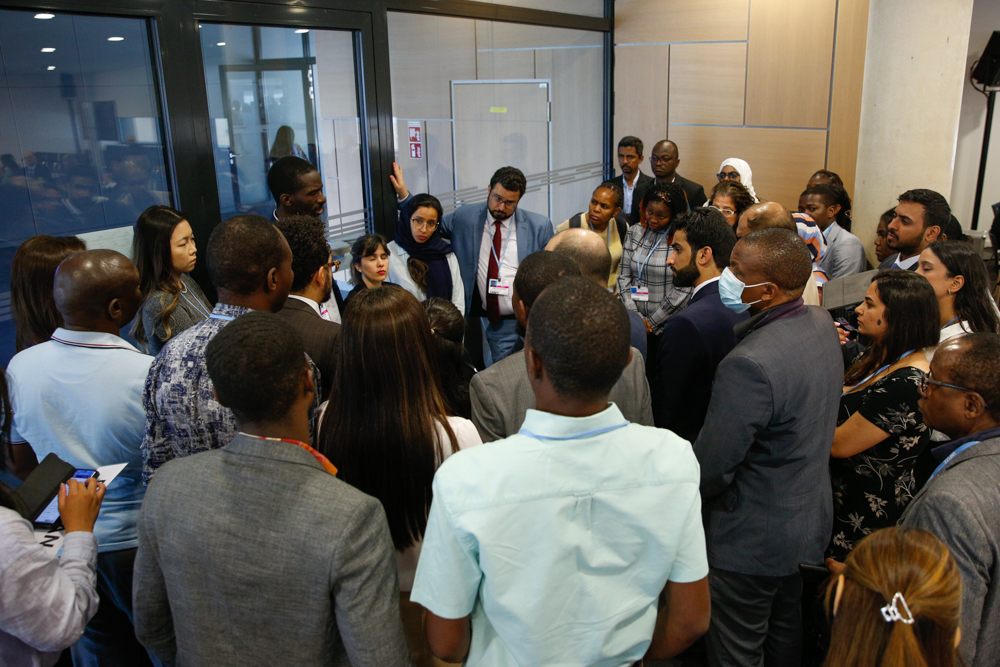
Photo: IISD/ENB – Kiara Worth
Making the enhanced transparency work for developing countries
By Ms. Khetsiwe Khumalo, Climate Change Programme Coordinator at the Ministry of Tourism and Environmental Affairs | Eswatini Meteorological Services & CVF Capacity-Building Fellow
The Enhanced Transparency Framework (ETF) under the Paris Agreement is a key element of the global response to the threat of climate change, as it aims to track and communicate the progress and effectiveness of the actions and support of all Parties. However, implementing the ETF poses significant challenges and opportunities for developing countries, which require adequate and sustained finance and technical support to meet their reporting obligations and enhance their capacities.
In this blog post, I will reflect on some of the discussions that parties had during the 58th session of Subsidiary Bodies (SB 58) of the United Nations Framework Convention on Climate Change (UNFCCC), which took place in Bonn, Germany, from 5 to 15 June 2023, in relation to the provision of finance and technical support to developing countries for enhanced transparency.
Enhanced transparency relies on trust and confidence among countries. Therefore, supporting developing countries in their transparency efforts is essential for the effective implementation of the Paris Agreement. When developing countries have access to necessary resources and technical assistance, it increases their ability to provide accurate and comprehensive information, fostering trust among all parties involved.
From the onset of the discussions Parties recognize that they are at different starting points in terms of their capacity and experience in preparing and implementing the ETF . This requires coordinated and robust national institutional arrangements, capacity to choose and apply appropriate methodologies and tools, and availability of quality data and information.
Discussions subsequently then focused on provision of financial and technical support to developing countries in the preparation of the transparency reports. As we know the first transparency reports are expected in December 2024 which is already a few months away. The discussions were built on the submissions that parties made ahead of the session. During the informal sessions, parties from developing countries led by the G77 and China and several of its sub-groups, retaliated against the main challenges they faced in relation to transparency, which included both institutional, technical, and financial challenges. Developing countries also emphasized the need to ensure that financial resources from the Global Environment Facility (GEF) should support institution systems and human resources to ensure sustainability and improvement overtime as opposed to only the use of external consultants. Even though several developed countries including the European Union and the Umbrella Group acknowledged the challenges, they did not agree to the proposal by developing countries of increasing financial resources by the GEF for the ETF citing that there are already a number of bilateral initiatives aimed at supporting developing countries on the ETF.
For the better part of the session, discussions focused on how to address challenges faced by developing countries in implementing the ETF in a sustainable manner, including the establishment and enhancement of national reporting systems within their respective national governments. Among other things, developing countries emphasized the importance and need of providing timely responses to requests from developing countries by the GEF and made calls to the GEF to provide adequate support for reporting to assist developing country Parties. In addition, they underlined the need to to further consider ways to improve its access modalities for developing country Parties seeking such support. These discussions touched on very sensitive issues linked to finance and guidance to the GEF. It was not a surprise then that in subsequent sessions, some groups brought in their finance negotiators in the room to guide the discussions ensuring that parties are consistent in their language and asked the GEF. Other proposals included;
- Creation of a multi-year work plan or programme to provide targeted and needs-based support to developing country Parties for strengthening their national reporting systems;
- Enhancing regional cooperation and creating regional platforms for promoting exchange of experience, lessons learned and best practices and to enable networking among Parties;
- Establishing a transparency platform to support peer learning through exchange of experience and lessons learned and knowledge-sharing, to collate information on capacity-building activities, to identify gaps and needs and promote matching of these needs with support.
Despite the rich discussions that parties had, it was difficult to agree on substantive conclusions rather parties agreed to continue consideration of this matter at SBI 59, taking into account submissions prior to SBI 59 on how to address challenges faced by developing countries in implementing the ETF in a sustainable manner, including establishment and enhancement of national reporting systems within their respective national governments.
Together4Transparency at SB58
Alongside the formal negotiations, the UNFCCC organized a series of Together4Transparency events at SB58 to promote greater transparency in climate action. The events covered a diverse range of topics, including from Parties’ preparation for the ETF to support opportunities for developing countries; from the role of non-Party stakeholders to the contributions of the transparency arrangements for the Global Stocktake; from the IPCC inventory software to the training and examination for becoming an expert conducting technical reviews under the ETF. The events aimed to raise awareness about the importance of climate transparency and to share best practices and experiences among stakeholders. I had the opportunity to attend a few of these events which included the launch of the new Climate Transparency Platform launched by UNEP-CCC as a knowledge sharing platform for all matters related to climate transparency. This platform coincidentally responds to one of the wish lists that parties have been discussing in the negotiation rooms. Needless to say, the Together4Transparency events shined a light on practical challenges and issues needed to be overcomed to ensure effective implementation of the enhanced transparency framework.
